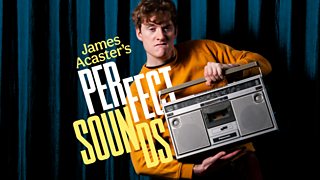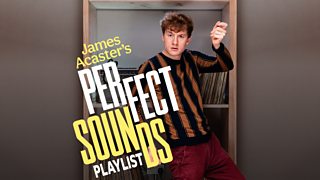James Acaster and the Healing Powers of Music for Mental Health
James Acaster's Perfect Sounds podcast started with a breakdown.
At the beginning of 2017, James Acaster split with his girlfriend and entered a period of significant mental stress, which culminated in thoughts of suicide. His path back to happiness involved therapy, many albums from 2016 and eventually a podcast.
Here James talks about coming to understand his own mental health and how music helped him through.

In the past you鈥檝e said that you didn鈥檛 take care of your mental health when you were younger. What do you mean by that?
I didn’t label things properly. I didn’t think [my] anxiety was anxiety, or depression was depression. I knew people who had severe versions of those things and I didn’t see it as a spectrum…I didn’t see that almost everyone experiences these things to some degree.
In 2013, I was in a relationship where I was extremely anxious all the time, for about five months. It was unbearable. But because the relationship was going badly, I thought, ‘Well, the relationship’s bad and that’s why I feel like this. It’s not a puzzle. I haven’t got anxiety or depression.’
In 2017, the end of another relationship led to your breakdown. What made you realise you needed to ask for help this time?
I started having serious suicidal thoughts for the first time.
I鈥檇 find myself thinking about ways I could kill myself鈥hat scared me.
I didn’t attempt it. I was in New York, the first time I’d ever been, which should have been really exciting. Instead I’d find myself thinking about ways I could kill myself…That scared me. I’m very lucky, personality-wise, that as soon as I recognise something needs doing, I’ll do it.
So as soon as I got back to England I booked a therapy session.
What expectations did you have of therapy?
It wasn’t the first time I’d been. When I was in that bad relationship in 2013 I went to one therapy session. But when I got home from that session, my girlfriend broke up with me. Maybe because she saw I was at the point of going to therapy and it was probably quite clear the relationship wasn’t going anywhere.
I went to a second session but I was feeling so much better. My suspicions were confirmed. My girlfriend didn’t want to go out with me. I didn’t feel like I was mad anymore. The lady just said, ‘Well, you seem fine now.’
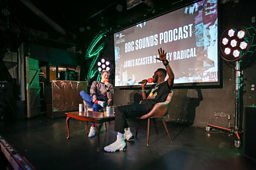
So what did you expect this time?
I thought it might be a bit like when you go to the careers advisor at school, and it is a little bit like that. You go into a room that feels neutral and comfortable.
What I learned is there鈥檚 no right or wrong way of doing therapy.
The start of the session is always the most awkward bit. They don’t want to steer you…It’s down to you to start. That was difficult for me at the beginning, but I soon started talking.
Money is always a motivation for me, so I thought, ‘If I’m spending all this money on a session I’d better get something out of it, otherwise I’m being ripped off.’…What I learned is there’s no right or wrong way of doing therapy. It’s whatever works for you. And that’s what the therapist is trained for, to do what works for you and not judge you.
That’s what’s so helpful, being in a space where you can say anything free of judgement. It’s hard to find that.
Do you think being a stand-up comic, i.e. someone used to explaining their thoughts to an audience, makes therapy easier?
I can’t talk for anyone else, but I think my whole life I’ve quite enjoyed the process of thinking out loud and figuring out how I feel as I talk. I’m quite happy doing monologues. So that probably does help in therapy.
One of the things I try to do in therapy is find natural places I can stop talking and let my therapist talk. What I want from it is ways of thinking that I can employ in my life. So next time something happens I’ll know how to deal with it a bit more.
So you want therapy to help you build up tools you can use later?
I think there’s a lot of emphasis put on the need to talk about mental health. I think that’s true, but also we need to act on it.
Taking that first step is huge. But there does need to be a second conversation about acting on it.
I don’t want to downplay the importance of talking about it…We do need to talk about it. There’s a whole load of people out there, mostly men, I guess, who won’t talk about or acknowledge mental health…I don’t want to say talking about it is not enough.
Taking that first step is huge. But there does need to be a second conversation about acting on it. Once you’ve got used to talking about it out loud, that help needs to be there too.
One of the things that helped you mentally, and became the basis for your podcast, was listening to the music of 2016. When did you realise that was something that was helping you?
Pretty early on. There was a week in January 2017 where I had a breakdown and I properly fell apart.
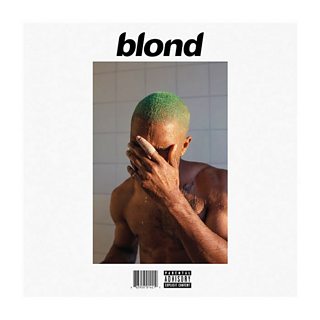
I found that discovering a new album or reading lists of the best music of 2016 would calm me down.
Before that, in 2016, I felt fine and I’d engaged with music again for the first time in ages…Up until then, I very rarely bought new stuff. I listened to old stuff but then Blackstar, Lemonade and Blond(e) came out in 2016. Those albums made me engage more with current music.
At that point it wasn’t consciously mental health related. But when I had that week [in New York] and the suicidal thoughts, it became a way of coping. I was feeling very isolated. When I was in the apartment alone I found that discovering a new album or reading lists of the best music of 2016 would calm me down, because it was the most recent thing I’d had any enthusiasm for.
I don’t want to say it was a reason to live but, if you’re having suicidal thoughts, something that has brought you enjoyment, even if it’s trivial, really does help. You’re in a stage where everything’s negative and hopeless. To find something that’s the opposite – positive, exciting, emotional – it helps.
What do you think it is about music that helped?
You’re connecting with another human being who made it. Even when the emotions it stirs are sad, it still feels good in some way. It became this way of making myself feel better. After a few therapy sessions I was consciously doing it to calm anxious thoughts.
If I discovered an album I loved, that was something positive I鈥檇 done that day.
I was on tour a lot that year and I’d have some shows I didn’t like, so sometimes I’d stay up and listen to new music. If I discovered an album I loved, that was something positive I’d done that day.
And you say even the sad ones helped?
A lot of albums mirrored my own emotions or I could relate to them, but even if I couldn’t relate to them, I was empathising with the person.
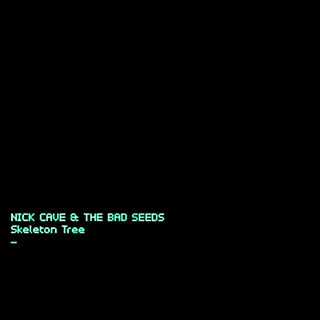
Nick Cave’s Skeleton Tree is maybe the saddest album I’ve ever heard. It’s about something unimaginable, the death of his son. I can’t begin to relate, but…[I was] thinking about someone else and their life and not just thinking about myself for a bit. I don’t even mean, ‘At least I haven’t got it that bad.’
It’s listening and caring about this person…it makes you feel the world is full of so many different types of people and we’re all going through this life together.
It makes you feel less alone.
What would you say the 2016 project has done for you?
Several things. There’s the whole mental health side of things, but it’s also changed how I look at music and subjectivity…You realise you’re your own person and there’s nobody exactly like you. The albums you like won’t necessarily be what everyone likes.
I don鈥檛 want there to be a consensus on which is the best year. I want you to go out and discover music that enriches your life
I often get people telling me 2016 isn’t the best year for music and telling me which year is…You’re not right and I’m not right…I don’t want there to be a consensus on which is the best year. I want you to go out and discover music that enriches your life and not just take on other people’s opinions.
The point of having guests on is because I don’t see my opinion as the be all and end all.

Do you still go to therapy now?
I tend to go every other week. There is still some stuff I want to figure out and understand a bit more.
I鈥檇 like to understand those periods of my life when I wasn鈥檛 happy, so I鈥檓 more prepared if it happens again.
There have been three points in my life where things have fallen apart. At 35, I’d be pretty naïve to think it won’t happen again. What I’d like is to understand why those three times happened, so if it happens again I can be more on top of it.
Right now, a lot of things are good.
I’m enjoying my career and my relationship…I’m not crippled by anxiety or waking up depressed. While I’m lucky enough to be in this happy period in my life, I’d like to understand those periods of my life when I wasn’t happy, so I’m more prepared if it happens again.
-
![]()
Listen to James Acaster's Perfect Sounds
James Acaster tries to convince comedians that 2016 is the greatest year for music, ever.
-
![]()
Listen to the Perfect Sounds Playlist
Another ten songs from 2016 aka 'The greatest year for music, ever'
